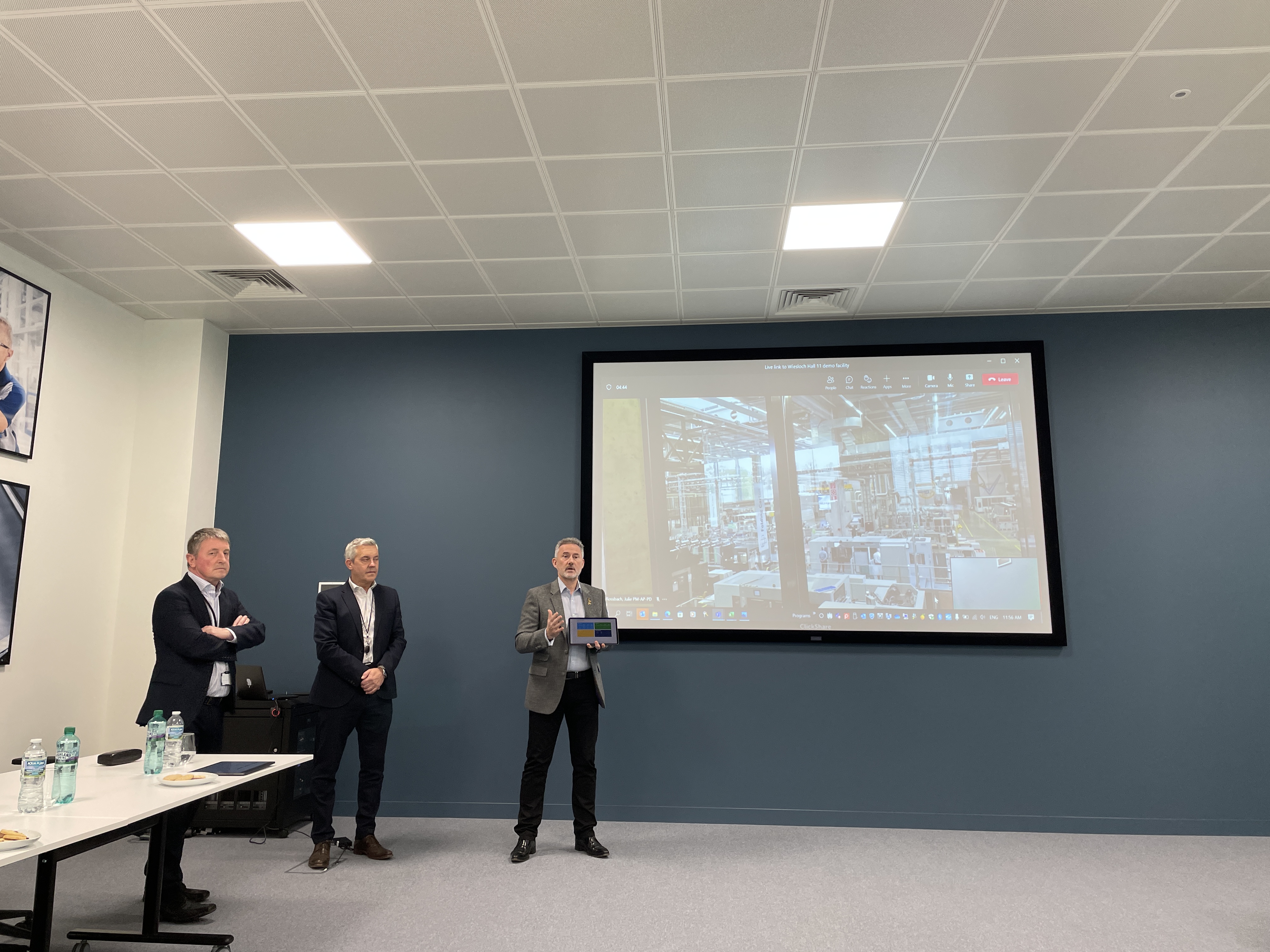In the year to 31 March 2022 Heidelberg’s UK business posted sales up 50% at £66.5m compared with the £44.2m of sales on continuing operations the prior year.
Excluding the £22.87m gain on the sale of its Brentford site, the business was back in the black and posted a £1.7m operating profit – a big turnaround on the £7.47m loss in the 2020/21 financial year.
Heidelberg moved to modern new premises at the Stockley Park campus near Heathrow Airport at the end of last year.
Prior to that, it had already outsourced its warehousing operations to Miniclipper in Leighton Buzzard.
Speaking at a press briefing at the Stockley Park facility yesterday, UK managing director Ryan Miles said the new location had refreshed the business and improved collaboration between teams.
“Our Brentford site became very old and stale, and also quite disjointed in terms of how we wanted to run our operation in the long-term. So we wanted to relocate our warehouse; this was a very big move for us – we moved all of our stock to Leighton Buzzard. After some initial teething problems, that’s worked out really well, and at the moment we're delivering fantastic picks and deliveries – we really have a great service level there,” he said.
About 50% of spare parts, and all consumables, are handled in Bedfordshire, with the other 50% of spare parts coming from the worldwide logistics centre in Germany overnight.
Some 6,000 lines of spares are held at Leighton Buzzard for overnight or same day delivery, as well as 2,000 pallets of consumables products.
“So that's really been a strength for us to look after customers, and that allowed us to free up and build a customer support hub, which we wanted to do,” Miles added.
“We wanted a new, refreshed premises, close to the airport and not too far from London so we can still be London-based as a business, which has served us well in the past.”
The Stockley Park demo facility includes digital printing and post-press equipment, plus a setup that allows customers to explore Heidelberg’s Smart Print Shop tools as well as the option to view live equipment demonstrations at Heidelberg’s main Wiesloch demonstration building in Germany, which houses a huge range of printing and finishing kit for commercial and packaging applications.
 Trengrouse, Rockley, and Chamberlain speaking at yesterday's event, with live link to Wiesloch on big screen
Trengrouse, Rockley, and Chamberlain speaking at yesterday's event, with live link to Wiesloch on big screen
Stockley Park’s showroom also has training facilities including a press simulator, and workflow and colour management training.
Head of software solutions Paul Chamberlain said that colour management training was “probably the most sought after” option currently, because of the changing skill set in the industry.
Similarly, post-press product manager Ian Trengrouse noted that “automation in the folder is now more critical than it’s ever been”, with non-expert operators able to set up and operate devices such as folders and guillotines via touchscreen prompts, with the job data automatically transferred and setup via Prinect, leading to huge time savings.
Chamberlain said the Heidelberg Plus cloud-based customer portal and ecosystem of apps and integrations was being beta tested by 30 customers worldwide, with four UK customers involved ahead of the official launch early next year.
The Heidelberg team live-linked with Wiesloch to demonstrate an eight-colour Speedmaster XL 106 Push to Stop perfector with fully-automatic plate changing via its plate to unit system. The press takes 55 seconds to change all eight plates, with the blanket and impression cylinder cleaning determined by the job data.
It took one minute and 30 seconds to change between jobs and get into sellable colour, with a run of 600 sheets taking just two minutes.
“This press can run seventeen 500 run jobs per hour, and we are competitive with digital in terms of breakeven,” said sheetfed and digital product executive Matt Rockley. “The next job is already being calculated by Prinect and it’s all automated.”
The press configuration shown would typically be used by web-to-print specialists.
New options include an automated waste extraction system in the delivery that takes waste sheets and shreds them, leaving a stack of purely sellable sheets.
Rockley said the automated systems were now also being extended to UV inks.
“We have automated ink pumping, even for UV, so for LED or LE-UV and we are set to have an installation of that in the UK next year,” he said.
“There's a new system being designed that allows us to pump UV inks because UV inks are very difficult to pump because of the heat curing the product in the lines.”
Separately, Heidelberg HQ in Germany said that the strong start to the year had continued into Q2.
At the half-year sales were up 14% on the previous year at €1.12bn and the group reported a “big improvement” in EBITDA, which rose by €30m to €104m.
The order backlog was more than €1bn “for the first time in year”.
Heidelberg stated: “This high order backlog and the half-year figures create an excellent basis to achieve the targets for the year as a whole”, but also flagged ongoing headwinds.
“In the second half-year, however, Heidelberg is expecting further increases in personnel and energy costs in particular.”
CEO Dr Ludwin Monz said he was pleased with the performance and growth in H1, but noted: “We remain cautious, though, because it’s not yet entirely clear how the global situation will develop.”
The forecast for the 2022/23 financial year is for an increase in sales to around €2.3bn and an EBITDA margin of at least 8% (2021/22: 7.3%).










